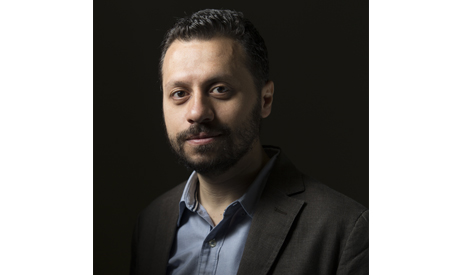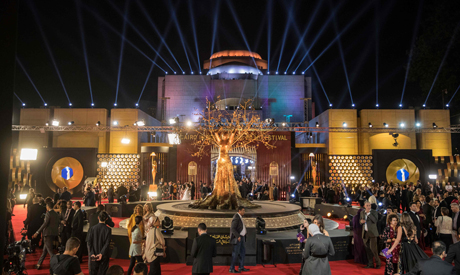“My dream was to restore the festival’s impact which had been lost over the years,” Mohamed Hefzy, now in his second year as president of the Cairo International Film Festival (CIFF), explains his vision of the festival. Turning the Cairo Opera House, CIFF’s main venue, into beehive full of engaged and cheerful young people was one target, evidencing the local impact of the festival. International impact was another: “I wanted the festival to reach world filmmakers who are involved in the industry.” This takes at least three years, but Hefzy feels he is on track: “You lay the foundations in the first year, stabilize it in the second, and in the third year you reap the harvest.”
An old event, CIFF had become ineffective for various reasons: state negligence resulted in a limited budget, unstable administration meant organisational difficulties, and failure to understand the competitive nature of the festival scene – the need for quality films and premieres, “which may have worked 20 years ago but doesn’t now” – lowered its standing.
Hefzy says an industry focus is crucial: “Hosting international industry expertise and the heads of the world’s important companies is just as important as hosting celebrities and filmmakers. Those people didn’t used to be on the guest list of the festival before, and that is part of what has changed since the last round.”Hence the Cairo Industry Days, established to provide a space for discussions, networking, meetings, workshops, master classes and partnership opportunities, with key international and regional industry professionals interacting and potentially collaborating with filmmakers from the Arab world. “That,” Hefzy says, “is what CIFF needed”.
Programming too had not been aggressive enough. Rather than waiting for other festivals’ “leftovers”, those films that are not selected, a festival should seek out and discover important new films before they are taken elsewhere. With an eye on the whole world and not just Europe, as used to be the case, CIFF now aims for a geographic balance that does not compromise quality. With help from correspondents and consultants there, each programmer is assigned some part of the world. CIFF programmers have also become more involved in international festivals and their markets. In addition, to “make a connection with the world”, the festival targetted international film media, advertising in such magazines as Variety and Hollywood Reporter.
Hefzy also conducted world tours to promote CIFF: “Last July I made a two-week tour of the USA, meeting with the heads of over 35 production companies.” Among the results is that a few days ago the Academy of Motion Pictures Arts and Sciences (AMPAS) awarded the CIFF the OSCAR qualifying film festival status. This means the winner of the Best Short Film Award will be eligible for consideration in the Animated and Live Action Short Film Categories of the Academy Awards without the standard theatrical run. Another boost to the festival’s international standing and image is that Netflix agreed to it opening with its latest production, Martin Scorsese’s The Irishman. “Authentic and modern, deep rooted and contemporary – that is CIFF’s new branding.”

Shawky
The 41st CIFF features over 150 films from 63 countries, 35 world and international premieres, and 84 Middle East premieres. However one could not ignore the fact that new Egyptian productions are limited to two feature-length documentaries, one in the international, the other in the Arab competition, and five shorts. According to Hefzy, himself a producer, the current environment in Egypt is not conducive to independent production. “There is a crisis and I am not optimistic,” he says. Compared to nine years ago, commercial cinema is recovering in terms of financial returns, but independent cinema requires “more freedom, greater flexibility, more windows for distribution and fewer obstacles”. On the other hand there should be a form of collaboration and cooperation between filmmakers who share a vision, to discuss solutions and come up with collective projects that can then be supported by film figures and intellectuals. “This is the only way to have an influence on the decision-making process, but at the moment unfortunately I don’t see such a gathering happening.”
Both the absence of the Dubai International Film Festival (DIFF) and the emergence of El Gouna Film Festival (GFF) – “which set a precedent for film festival glamorous in both content and appearance in Egypt” – facilitated CIFF’s new look in 2017, with sponsorship from DMC television, but without a strategic plan content did not improve. By 2018, with Hefzy on board, a comprehensive plan could be implemented. “We wanted to expand the management structure by contracting outsider expertise and that needed a budget and sponsors. I had to persuade private-sector sponsors to take part and to reduce the burden on the Ministry of Culture. This year only 50 percent of the festival budget is out of ministry funds. This means the festival is well on in its way to depending on its recourses. It also means it has a greater influence and reaches a wider audience.”
But Hefzy does not feel he can remain festival president for longer than three years. “It’s not what I had planned,” he says. “CIFF is an extremely important festival which gives me as much as I give it, but I don’t see myself as president for seven years. Of course I am concerned that my successor will not recognise what has been achieved. Will the understand the importance of the Cairo Industry Days? Will they be willing to build on existing bases or start from scratch?” Hefzy still hopes to reach an even wider audience and to bring the casts and crews of major films to the festival, he dreams of CIFF becoming the world’s gateway to Arab cinema and vice versa. “And that takes time,” he says. “The third year will reveal a lot about the future.”
***

The Cairo International Film Festival (20-29 November) set up outside the Cairo Opera House, Main Hall, with a statue of the logo referring to the festival embracing the 50/50 by 2020 initiative and symbolising world cinema rooted in Egypt (photo: AFP)
As for CIFF’s acting artistic director, film critic Ahmed Shawky is optimistic. Under the late Youssef Cherif Rizkalla, he says, “I was the deputy artistic director for four rounds before this year and I can see how things are getting better,” he says. “Quality is our number one criterion, and then there is premiere status, award-winning films known to the audience, and a balance in the geographic representation”. Losing Rizkallah in the middle of the year was a huge, Shawky adds, and the edition dedicated to him “needs to be worthy of his name”.
The Horizons of Arab Cinema competition now includes 12 instead of eight films, a decision Shawky wholeheartedly supports despite instability in Arab film production. Of the 70-90 Arab films annually produced, 30-35 will have the required standards. “Where should they all go?” For 14 years the Dubai Film Festival provided four Arab competitions and screening programmes. After it folded only Carthage, El Gouna, Marrakesh and Cairo were left. “This means there are fewer slots than productions, forcing you to ignore good films.” Even with the Red Sea Film Festival and Amman Film Festival, both starting next year, there will still be room for more good films.
For the first time this year, CIFF includes a documentary film in the international competition, Marian Khoury’s Let’s Talk. Shawky insists this has nothing to do with the lack of a feature film in the competition. “It would still have been included. It’s an important film which was screened in the CIFF only three days after its world premiere in the International Documentary Film Festival in Amsterdam, the most important documentary festival in the world. Khoury is well-known as a director and producer. Her last film, Shades (2010), opened Venice International Film Festival. Her other three films were internationally appreciated...”
Compared to seven Egyptian features last year, a mere two this year demonstrates how film production in Egypt “works randomly, without any planning”, Shawky says. “A festival can not invent films, it can only improve its selection mechanisms and provide limited support through its industry programmes. The state needs to have a national film fund to support Egyptian film production.” The 41st CIFF includes three films that previously participated in the Cairo Film Connection, the industry programme: Before it’s too late by Majdi Lakhdar, A Son by Mahdi M. Barsaoui, and Beirut Terminus by Elie Kamal. This year, Shawky adds, “we are looking forward to being in contact with all the project participants in the Cairo Film Connection, even those that did not win an award, so we can have a network of filmmakers who have films in production. That is how we should think about the future”.
*A version of this article appears in print in the 28 November, 2019 edition of Al-Ahram Weekly.
Short link: